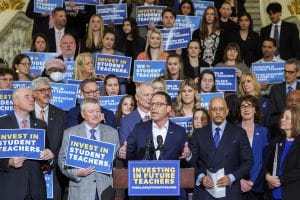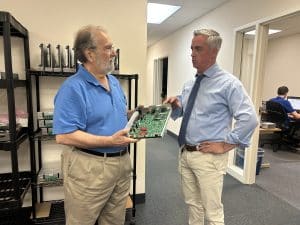Across the commonwealth, Latino voters make up six percent of the electorate while they constitute more than a quarter of the persons in poverty. For good reason, Latinos in Pennsylvania are paying close attention to politics, with the economy as their primary issue. In fact, according to a UNIDOS US commissioned poll last month, the top four concerns are the pocketbook issues of inflation, jobs, housing and healthcare.
Statewide elections have come down to single percentage point wins in the last few presidential cycles. While no demographic speaks with one voice, if six percent of the population leans one way or the other, Latino voters could tip the balance in November. Consequently, Democrats and Republicans alike, are campaigning hard for their support.
Jasmine Rivera, executive director of Pennsylvania Immigration Coalition (PIC), thinks the candidates need to be very clear in their messaging. “We are hearing there is concern about the economy, the cost of living.” Specifically, the items of greatest concern are, “grocery costs, housing costs and student debt.”
While inflation hasn’t hit Pennsylvania pocketbooks as hard as it has in other states – Moody’s Analytics actually rates the rolling cost increases in the keystone state this year at 1.8 percent (the lowest in the nation) – the compilation of higher prices compounded since 2019, have made an impact on individual and family budgets. While inflation appears to be settling-in, at or below the Federal Reserve’s desired 2 percent rate, food costs jumped 28 percent since 2019, causing pain to consumers. And that discomfort hasn’t gone away.
Heidi Roux, a Salvadoran naturalized citizen who came to the United States at age nine, voted in her first election in 1996. As a Bucks County activist working for the rights of immigrants across the commonwealth, she believes that politics comes naturally for people who leave their native countries in a period of crisis. “Personally, I’ve never had the luxury to not think about politics. I grew up during a time of civil war in my country [of origin]. I think growing up at a time of political unrest influences someone’s involvement.”
Record spending on political ads in the Keystone State proves how invested all sides are in the choices made by PA voters. Swing state polling numbers emphasize the importance of activating Pennsylvania’s Latino population in the November election with some candidates making a push to hear from the Hispanic voters in their district.
Despite former President Trump’s campaign opening an office in Reading, specifically to make a pitch to Latino voters – and while the Bucks County Beacon repeatedly reached out for comment – over email, phone, and eventually with an in-person visit to Republican Party headquarters – only Democratic party candidates responded to requests to discuss the importance of the Hispanic vote.
Incumbent Senator Bob Casey’s office emphasized that he’s made fighting the rising cost of everyday items a cornerstone of his re-election campaign – employing his storied shrinkflation campaign as part of a larger effort. Understanding that the economy is of particular interest to his Hispanic constituents, Sen. Casey has dedicated resources aimed at communicating directly with Latino voters.
Tiernan Donohue, the senator’s campaign manager, emphasized the importance of their outreach, “Senator Casey is committed to ensuring the Latino and Hispanic communities across our Commonwealth have an ally in Washington.”
Poverty statistics across the commonwealth show that Latino voters need that ally more than any other sub-population. In 2020, less than nine percent of white Pennsylvanians lived in poverty – one third the 26.2 percent poverty rate for Latinos. In fact, Latinos are the most economically disadvantaged demographic in Pennsylvania.
READ: Why the Far Right Lies About Immigrants
Senator Casey’s campaign promises more economic relief. The campaign points to successful legislation proposed and/or supported by Senator Casey during his most recent term in office. They highlight the Inflation Reduction Act, as a way he’s lowered costs for PA seniors enrolled in Medicare (nearly eight percent of whom are Hispanic), including rule changes that give Medicare the power to negotiate prescription prices.
Casey was also the original co-sponsor of the Working Families Tax Relief Act, which would make the expanded Child Tax Credit permanent, and expand the Earned Income Tax Credit. The U.S. Center on Budget and Policy Priorities estimates that if passed, the legislation would increase incomes for more than 4 million Pennsylvanians, 72,000 families in Bucks County and 161,000 Latino families, statewide.
The UCLA Latino Policy and Politics Institute (LPPI) recently released data indicating that Pennsylvania’s 580,000 Latino voters could impact the national election, as well as specific state races.
Roux agrees. She thinks younger members of her community will be motivated by the topics of “immigration, economy, education and healthcare.” And the LPPI also notes that younger voters may make a big difference – noting, “Latino adults in Pennsylvania are significantly younger than eligible voters as a whole. The share of young eligible voters ages 18 to 24 who are Latino is four percentage points higher than the Latino share of the overall electorate.”
Ashley Ehasz, candidate for U.S. Congress in PA’s first district and endorsed by the Congressional Hispanic Caucus’ BOLD PAC, issued a statement through her campaign. Ehasz called for more immigrant enfranchisement with, “a pathway to citizenship for 11.5 million … DREAMers and DACA recipients … who have already made America their home.”
As an advocate for immigrants, Roux likewise believes standing for people who don’t yet have the right to vote is important. Even when she casts her own ballot, she feels the responsibility of choosing carefully, especially because so many in her immigrant community can’t vote. “It’s our duty to get out and vote our conscience. I value the civic importance of voting. As a mother, I vote especially for those who can’t vote because they are under 18.”
Rivera too, knows the importance of voting, but not just in for congress, the senate or the White House. Local elections matter to Latinos. Rivera’s Pennsylvania Immigration Coalition consists of 60 member organizations who have worked diligently to create needed change. “When we talk about democracy, it’s often relegated to election day. Democracy is when people participate every day. It’s knowing who your elected representative is, up and down [the ballot]. If you don’t know, you’re not holding them accountable.” Rivera would like Pennsylvanians to remember, “Voters don’t owe candidates anything. Candidates have to earn their support.”
Because no Republican responded to requests for comment, this paper could not ascertain if Candidate Dave McCormick taking campaign contributions of $10,000 each from two of the 2020 fake electors including Bucks County GOP Chair Pat Porpik, made him a man less likely to earn that support.
Roux shared concerns for election integrity, stating that she votes early by mail to assure that her vote is counted. Concerns for election integrity are more than hyperbole as this paper reported last month that a total of five fake electors were supporting the Republican presidential candidate again, this year.
READ: The Theology Behind the Christian Nationalist View on Immigration
One lawmaker who recently delivered on their promises is Rep. Johanny Cepeda-Freytiz from Berks County. Cepeda-Freytiz proposed HB 1067 and worked diligently to expand public school teacher qualifications to include non-citizen green card holders.
To Rivera – that’s delivering on a promise that serves all the people, not just the immigrants directly impacted with jobs. “When that law passed, there were 5,000 empty teaching positions. This was a huge blind spot. And now, in many cases, students have teachers that reflect their own experiences.” In communities like Reading, where the majority of the students speak Spanish, it also means they have a better chance of having teachers that are also bilingual.
Rivera and her coalition have a short list of agenda items, including simple needs for the immigrant community, like drivers’ licenses. They’ve issued a report on the massive but often overlooked contribution immigrants provide to the commonwealth. The overarching message? Whether naturalized citizens who can vote, or guests in our country, immigrants – Latino and otherwise – must be considered by newly elected or re-elected leaders, no matter how high the office they hold.
And as local and national candidates woo Latino voters, Rivera has a note of caution for candidates that simply pander to her community. “People are tired of empty promises. People want to see actual change in their lives.”
This article is part of U.S. Democracy Day, a nationwide collaborative on Sept. 15, the International Day of Democracy, in which news organizations cover how democracy works and the threats it faces. To learn more, visit usdemocracyday.org.







